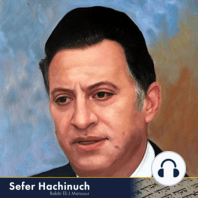20 min listen
Misva #395: Ma’aser Rishon – The Annual Tithe for the Leviyim
FromSefer Hachinuch
ratings:
Length:
20 minutes
Released:
Feb 16, 2023
Format:
Podcast episode
Description
The Torah in Parashat Korah (Bamidbar 18:24) commands, “For I have given to the Leviyim Beneh Yisrael’s tithe which they separate as a donation…” This verse establishes the Biblical command to donate one-tenth of one’s agricultural produce to the Leviyim, a tithe known as “Ma’aser Rishon” (literally, “the first tithe”). The Sefer Ha’hinuch explains that since Levi is the tribe chosen to serve G-d in the Bet Ha’mikdash, it is appropriate that the Leviyim receive their livelihood respectably, without having to take time away from what the Sefer Ha’hinuch calls “Abodat Ha’melech” – their “service to the King.” As there are twelve tribes, the Leviyim actually receive more agricultural produce than the other tribes, as each tribe receives just one-twelfth, and the Leviyim receive one-tenth. Moreover, the Leviyim receive their share without incurring expenses, such as purchasing the land, buying equipment, and hiring labor. The reason, the Sefer Ha’hinuch explains, is because the merit of supporting the tribe of Levi, G-d’s servants, brings material blessing. As the Sages teach, “Ma’aserot Seyag La’osher” – tithing one’s produce brings wealth. The Sefer Ha’hinuch notes in this context the Rabbis’ teaching that it is permissible to “test” G-d in this regard, to give Ma’aser and then anticipate the reward of wealth. The command of “Lo Tenasu Et Hashem Elokechem” (Debarim 6:16) forbids testing Hashem, but the Rabbis teach that the Misva of Ma’aser marks an exception to this rule. One may not say, “I am going to observe Shabbat, and let’s see if Hashem makes me rich because of it,” but when it comes to Ma’aser, one may make such a “test.” Therefore, the Torah commands giving the Leviyim a full one-tenth of one’s produce, as one earns wealth in this merit. Unlike Teruma (the portion of produce that one must give to a Kohen), which is sacred and permissible for consumption only by Kohanim, Ma’aser Rishon does not have any status of Halachic sanctity. Once it is given to a Levi, and the Levi separates one-tenth to be given to a Kohen (“Terumat Ma’aser”), he may share the Ma’aser Rishon with anyone, even ordinary Yisraelim. The Torah obligation of Ma’aser Rishon applies only to “Dagan” – the five principal grains (wheat, barley, spelt, rye and oats), “Tirosh” – wine, and “Yis’har” – oil. Ma’aser Rishon is required for other agricultural produce Mi’de’rabbanan (by force of Rabbinic enactment). Torah law requires separating Ma’aser Rishon only from produce which one intends to eat; produce which one intends to sell does not require Ma’aser Rishon on the level of Torah obligation. Produce requires Ma’aser Rishon once it reaches the “Onat Ha’ma’aser” (literally, “the tithing season”), meaning, from the time when it reaches a certain point in its growth process. Generally, this is determined to be the point at which the product can be planted in the ground and reproduce. At this point, even though the product has not fully ripened, it requires Ma’aser Rishon. One may partake of the produce “Achilat Arai” (literally, “temporary eating”) – meaning, as a snack – before separating the required tithes, but he may not make a meal out of the produce at that point without first separating the obligatory portions. Once all the work required for this product has been completed, then even “Achilat Arai” is forbidden. An example is grain which is harvested and then made into a pile. This marks the completion of the work needed for this produce, and thus at this point, tithes must be taken even if one wishes to eat some only as a snack. If produce is brought into the home, then it requires tithing only if it is brought through the front door. If it is brought through the backdoor or a window, then it does not require tithing. This Misva is binding upon both men and women, and even to Kohanim and Leviyim. If a Levi grows produce, he must give Ma’aser Rishon. This obligation applies only in the Land of Israel. Outside the Land of Israel, although the Misva of
Released:
Feb 16, 2023
Format:
Podcast episode
Titles in the series (100)
Misva #19: The Prohibition Against Eating Hametz on Pesach: Daily Sefer Hachinuch - Brought to you by itorah.com by Sefer Hachinuch
